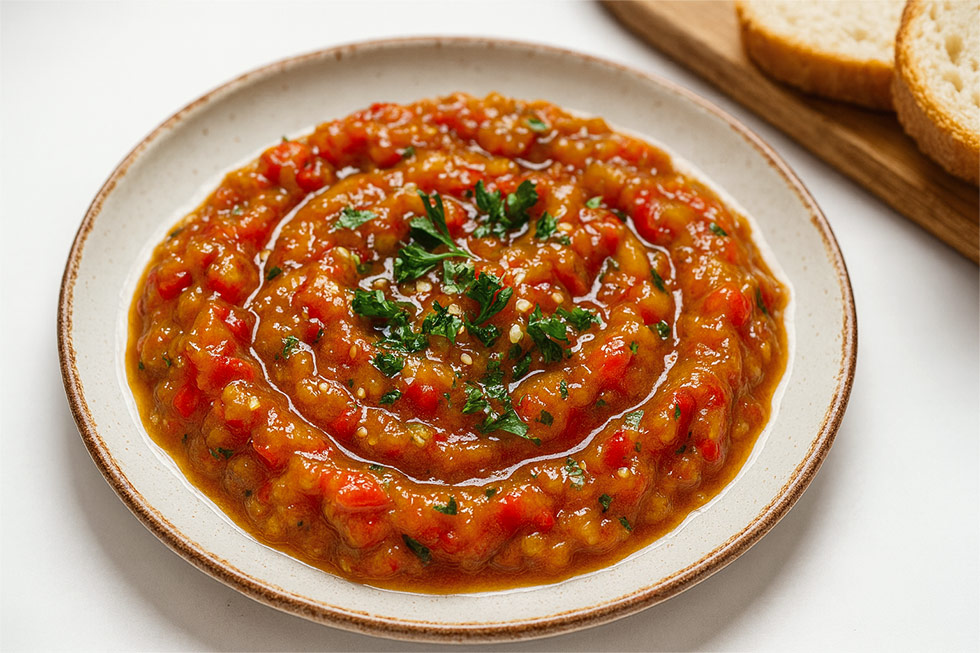Silky roasted eggplant and sweet red peppers mashed with garlic, parsley, and a bright kiss of a drop of vinegar, the kyopolu is Bulgaria’s beloved late-summer spread. It’s light yet intensely smoky, perfect on warm bread or alongside grilled meats. Use freshly roasted vegetables for the best perfume (see our Traditional Bulgarian Roasted Red Peppers guide for technique and peeling tips).
Preparation Time
- Prep Time: 25–30 minutes
- Roasting Time: 25–40 minutes (method-dependent)
- Total Time: ~1 hour
Ingredients (Serves four people)
- 2 large eggplants (about 900 g total)
- 3 large red kapia peppers (about 450 g) – roasted and peeled
- 3–4 cloves garlic, finely minced (to taste)
- 3 Tbsp sunflower oil (traditional) or extra-virgin olive oil
- 1–2 Tbsp white wine vinegar or apple cider vinegar (to taste)
- 1 small bunch flat-leaf parsley, finely chopped
- 1 medium tomato, peeled, seeded, and finely chopped (optional, for freshness)
- 30 g walnuts, lightly toasted and chopped (optional, regional)
- ½ tsp sugar (balances acidity; optional)
- Salt and freshly ground black pepper
Note: 1 tablespoon is approximately 15 ml, and a teaspoon is approximately 5 ml. Peppers must be thick-fleshed, such as Bulgarian red peppers, as they need to caramelize and will slightly burn during roasting.
If you haven’t roasted the peppers yet, use the Oven/Grill or Chushkopek methods from our Traditional Bulgarian Roasted Red Peppers recipe.
Preparation Method
Step 1: Roast the eggplants
Prick each eggplant several times. Roast over a hot grill, directly on a gas flame, in a 230–250°C (450–480°F) oven, or in a chushkopek until skins are charred and the flesh has collapsed (20–35 minutes). The deeper the char, the smokier the flavor.
Step 2: Steam & peel
Transfer hot eggplants (and peppers if roasting now) to a covered bowl 10–15 minutes to loosen skins. Peel carefully. For eggplants, split and scoop out the flesh; drain in a sieve 5–10 minutes to remove excess juices and bitterness.
Step 3: Chop or mash
On a wooden board, chop the eggplant flesh and roasted peppers very finely with a knife (traditional) or pulse 3–4 times in a processor—keep some texture.
Step 4: Season
In a bowl, mix eggplant and peppers with garlic, half the parsley, oil, and a drop of vinegar. Fold in tomato and walnuts if using. Add sugar (if needed, not a popular approach), salt, and pepper (pepper is optional). Taste and balance: you’re aiming for smoky-sweet with a gentle acid lift.
Step 5: Rest
Cover and chill 30–60 minutes to let flavors marry. Bring to room temperature before serving, then finish with the remaining parsley.
Tips and Tricks
- Drain the eggplant: Short draining avoids watery kyopolu and concentrates flavor.
- Garlic control: Add gradually—fresh Bulgarian garlic is potent.
- Texture: Hand-chopping yields the classic rustic spread; over-processing makes it pasty.
- Pepper prep: For perfect peppers, follow our Traditional Bulgarian Roasted Red Peppers method—don’t rinse under water after peeling to keep the smoky juices.
- Make it creamy: Whisk in 1–2 Tbsp thick yogurt for a softer, lunch-salad style (non-fasting days).

Serving Suggestions
- Spoon into a shallow dish, drizzle with sunflower oil, sprinkle with parsley, and (optional) sprinkle with crushed walnuts.
- Serve with warm country bread, grilled flatbread, or toast; pairs beautifully with white brined sirene cheese, olives, and tomato–cucumber salad.
- As a side, add a quenelle of kyopolu to grilled meats, kebapche, or fish.
Wine Matching
- White: Dry Dimyat, Misket, or a citrusy Sauvignon Blanc to cut the smokiness.
- Rosé: Melnik or Syrah rosé for summer tables.
- Light red: Chilled Gamza (Kadarka) pairs well with grilled meats.
Nutritional Information (per serving, approx.)
- Calories: ~180 kcal
- Fat: ~11 g
- Carbohydrates: ~17 g
- Protein: ~3 g
- Fiber: ~6 g
- Sodium: varies with added salt
Dietary Modifications
- Vegan / Lenten: As written (omit yogurt garnish).
- Nut-free: Skip walnuts.
- Low-oil: Reduce oil to 1–2 Tbsp; add extra chopped tomato or a splash of pepper juices.
- Low-FODMAP tweak: Reduce garlic; infuse oil with a smashed clove, then remove it.
Storage Suggestions
Cover and refrigerate up to 3–4 days; flavor improves on day two. For longer keeping, portion and freeze up to 2 months (texture softens slightly after thawing—refresh with parsley and a splash of vinegar).
About Kyopolu
Kyopolu is a traditional Balkan spread and salad, most closely associated with Bulgaria (and also found in parts of Turkey and North Macedonia). It celebrates late-summer produce: eggplants and red peppers roasted until sweet and smoky, bound with garlic, herbs, and a bright acidic edge. Families customize it—some add tomatoes or walnuts, others keep it ultra-simple.
Cultural Context
During pepper and eggplant season (late August–October), Bulgarian neighborhoods are perfumed with roasting aromas. Households roast in batches, on grills, over gas flames, or in the chushkopek, then turn part of the bounty into kyopolu and preserve the rest for winter. Because the appetizer is so widespread, recipes vary by region: in Thrace, cooks often add a little tomato and a pinch of sugar for sweetness; in the Rhodope Mountains, you’ll see walnuts for richness; along the Danube Plain, a touch of hot pepper brings gentle heat; in Strandzha and the Southeast, extra garlic and parsley keep it vivid and herbal; around Plovdiv, some add roasted tomatoes for a brighter, looser texture; in Sofia, many prefer a smoother, more emulsified spread with a thread of oil. Kyopolu appears on everyday meze platters, at Sunday lunches, and on holiday tables, often alongside Roasted Red Peppers (Печени чушки) dressed with garlic, parsley, and vinegar. It’s a taste of summer sunshine carried into cooler months—simple, honest, and deeply Bulgarian.


